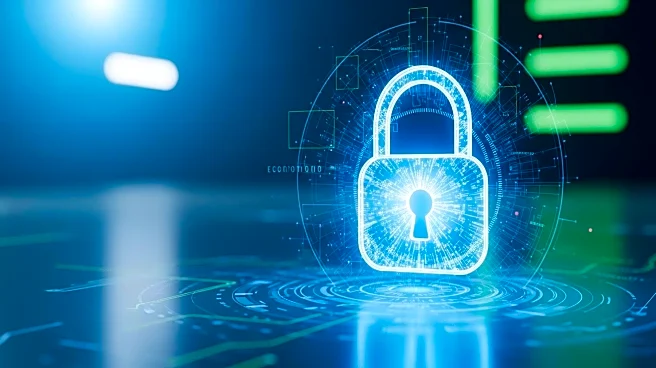What's Happening?
Signal, a widely used communications app, is enhancing its security measures by introducing quantum-resistant encryption to its messaging system. The new encryption layer, known as Sparse Post Quantum Ratchet (SPQR), is designed to protect conversations from potential decryption by future quantum computers. This development aims to maintain Signal's key features such as forward secrecy and post-compromise security, even in a post-quantum world. Currently, Signal uses elliptic curve cryptography, which is robust against today's computers but could be vulnerable to quantum machines in the future. The new protocol will work alongside the existing Double Ratchet protocol, creating a 'triple ratchet' model that requires attackers to defeat both the elliptic curve system and the quantum-safe algorithm to gain access. Signal plans to gradually roll out this upgrade across its user base, ensuring compatibility and security without burdening users or networks.
Why It's Important?
The implementation of quantum-proof encryption by Signal is a significant step in safeguarding digital communications against future threats posed by quantum computing. As quantum technology advances, the risk of 'harvest now, decrypt later' scenarios becomes more plausible, where encrypted data collected today could be decrypted in the future. By adopting quantum-resistant encryption, Signal is proactively addressing these concerns, ensuring that user privacy and data security remain intact. This move sets a precedent for other messaging platforms to follow suit, potentially influencing industry standards and practices in encryption technology. The collaboration with experts and rigorous testing further underscores the importance of robust security measures in the digital age, where data protection is paramount.
What's Next?
Signal's gradual rollout of the SPQR protocol will continue, with the company ensuring full compatibility during the transition. Once all clients support the new encryption layer, Signal plans to make the upgrade mandatory for all sessions. This approach ensures that users benefit from enhanced security without experiencing disruptions. As quantum computing technology progresses, other messaging platforms may also adopt similar measures to protect their users' data. Signal's proactive stance may encourage further research and development in quantum-safe encryption methods, potentially leading to broader adoption across the tech industry.
Beyond the Headlines
The introduction of quantum-proof encryption by Signal highlights the growing importance of preparing for future technological advancements that could impact data security. This development raises ethical considerations regarding the responsibility of tech companies to protect user data against emerging threats. It also underscores the need for continuous innovation in encryption technology to stay ahead of potential vulnerabilities. As quantum computing becomes more accessible, the demand for quantum-resistant solutions is likely to increase, prompting further exploration of hybrid encryption models and collaborative efforts among tech companies and researchers.









